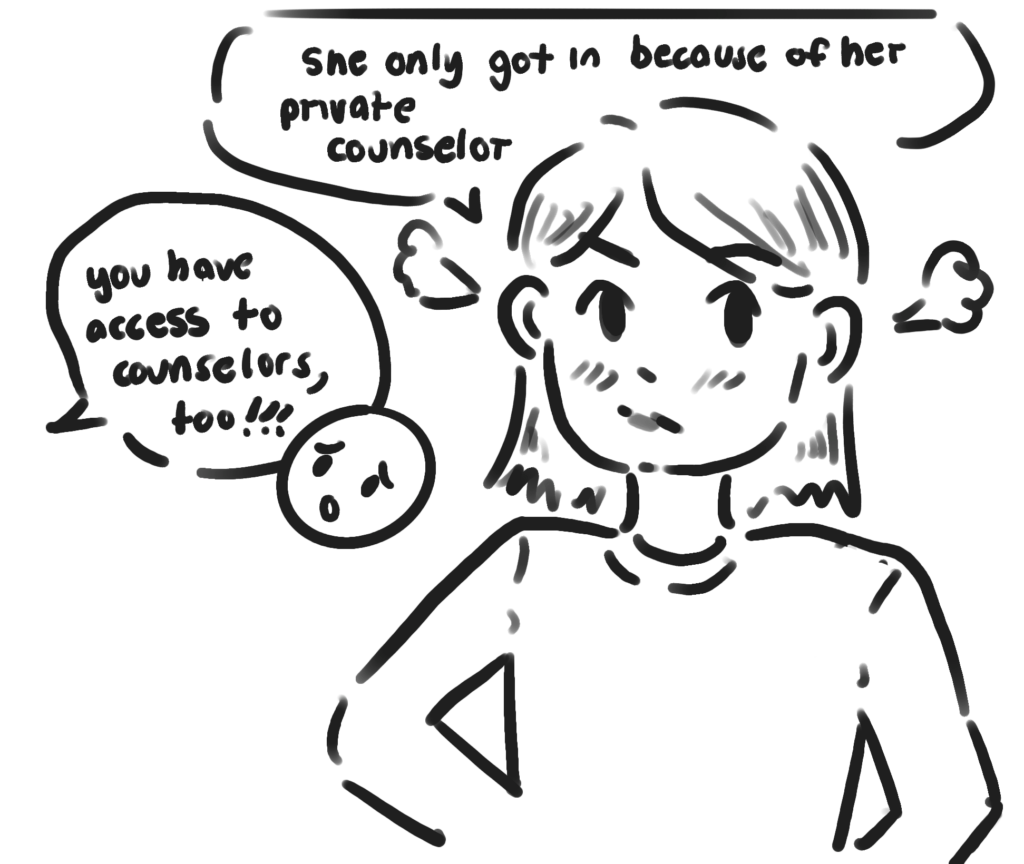
According to the Education Data Initiative, the number of college students in the United States has increased from 7.4 million in 1970 (3.6% of the population) to 19.0 million in 2020 (5.8% of the population). This boom has expanded the secondary education industry, extending access to private college counseling for high schoolers who seek that specialized outside support.
“[I got a private counselor] so I wouldn’t be stressed out in junior year [about] not knowing what kind of college I want to go to or the things that I’m interested in,” said junior Sophia Hsu. “[My counselor] has this website that has a list [of colleges for me to] do my own research on. She’s also helped with [extracurricular] activities I could do to show my interest [in a subject] outside of school.”
However, private counseling, like any other tool, is not a guaranteed method to build students into the “perfect” applicant. Instead, counselors seek to enhance what is already there.
“[College counseling] is a supportive role,” said independent private college counselor Helena Prigal. “[A] guide can be helpful with different parts of the process … It’s helping the student bring out their stories [to write about in essays] … I try not to bring in too many new ideas. I try to be more of a sounding board because it’s the student’s process, not my process.”
At the same time, some discourage the use of private counselors, citing the need to learn independence.
“I definitely have heard [stories of private] counselors where they … guide them into … doing certain types of activities or adjusting their resume to not [fit] the … student’s needs and interests,” said career and CTE coordinator Queenie Hua. “Students should be able to step back and not only rely on the research of the private counselor, and they can double-check with school counselors [as well].”
Even with these considerations, many students still desire the benefits of a private counselor.
“It’s [not] necessarily unfair [for students to use private counseling] because if you [can] access it, [you should] totally take advantage of it,” said senior Maylani Fiel-Mata. “I just think that it was unfortunate that I was unable to have that kind of help. … I think I would have challenged myself more academically if I had a college counselor because I feel like they would [have set] certain requirements that I needed in order to get into the college I wanted to get into. I didn’t even apply to my dream college because I didn’t think I was qualified.”
On the other side of the spectrum is the Aragon college counseling team, accessible to all students. A few of their expertises include aiding students in exploring college options, editing essays and providing information for career-specific activities, such as internships. Hua believes that using school resources can impart knowledge that serves students beyond college applications.
“If you are relying solely on a private college counselor, [it] may hinder [you] from developing essential skills such as decision-making, problem-solving and self-advocating,” Hua said. “It is important for students to take an active role in the college application process and develop the necessary skills for success instead of just having someone guide them every single step.”
A more guided alternative that Aragon provides is the Advancement Via Individual Determination program. In the Advanced Via Individual Development class, students journey through high school with the same teacher and classmates for four years, forming a close relationship. The class targets students who want to attend a four-year college, but may not have the information or resources to plan for that independently. As well as being more financially accessible than private counseling, AVID seeks to impart skills students will use for a lifetime.
“We focus on WICOR (Writing, Inquiry, Collaboration, Organization, Reading) [which] are all skills and strategies for success in high school, college and their chosen career path,” said AVID and English teacher Tiffany Chiaro. “[For example], organization is not just writing in your planner. It’s organizing your four-year plan. … What’s your end goal? What are you going to do to get there? What habits do you need to develop? What habits do you need to drop?”
While many students who use private college counselors only begin seriously planning for college as upperclassmen, AVID begins the process from ninth grade.
“In freshman [and] sophomore year, you start writing your UC prompt,” said senior Caitlyn Solares. “[AVID] helps you as far as financial [deadlines], the applications [and] scholarships. It breaks down everything for you. There’s not one thing that [gets] left out.”
With college being a goal for many Aragon students, they seek help from different areas, each with benefits and disadvantages.




